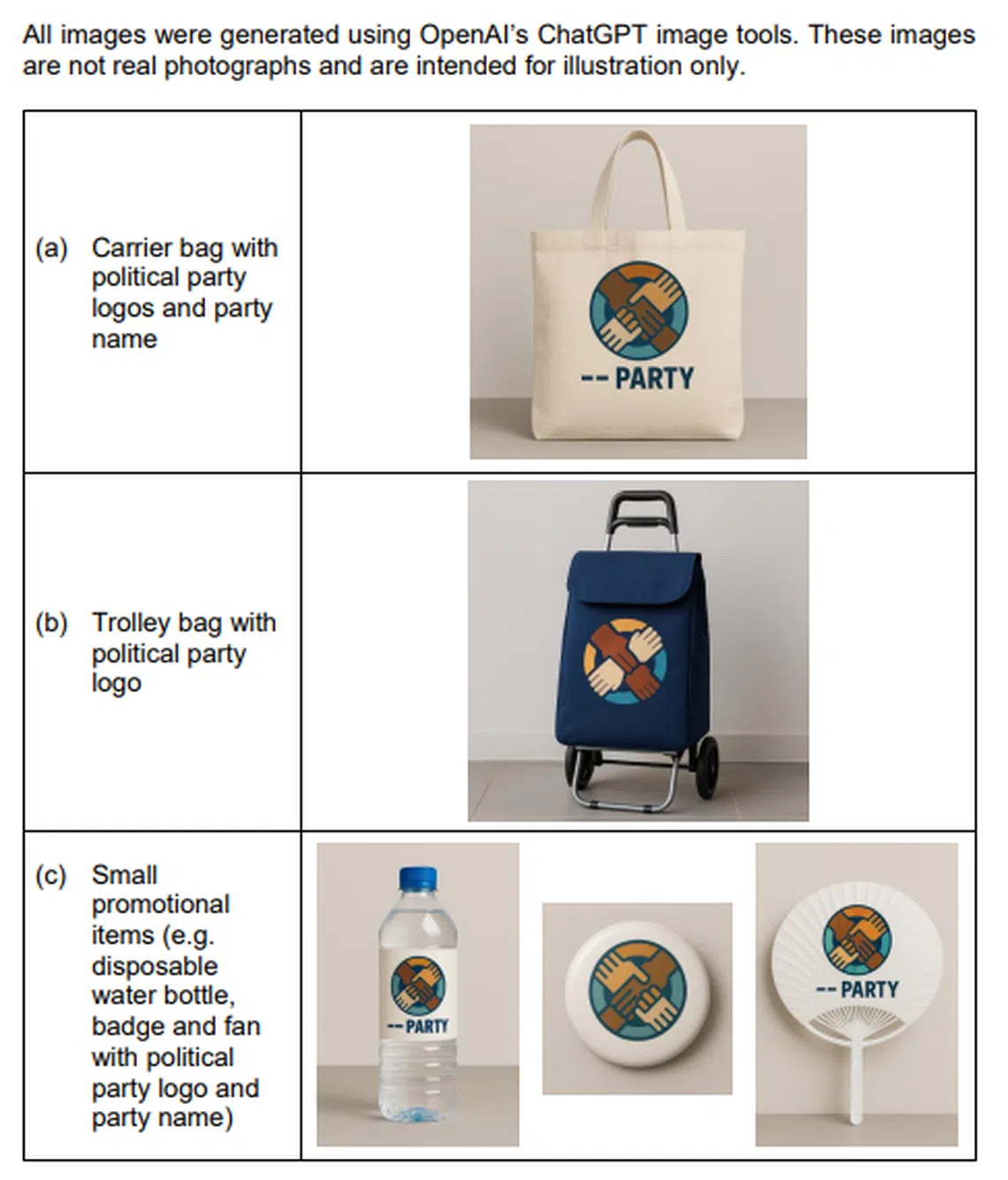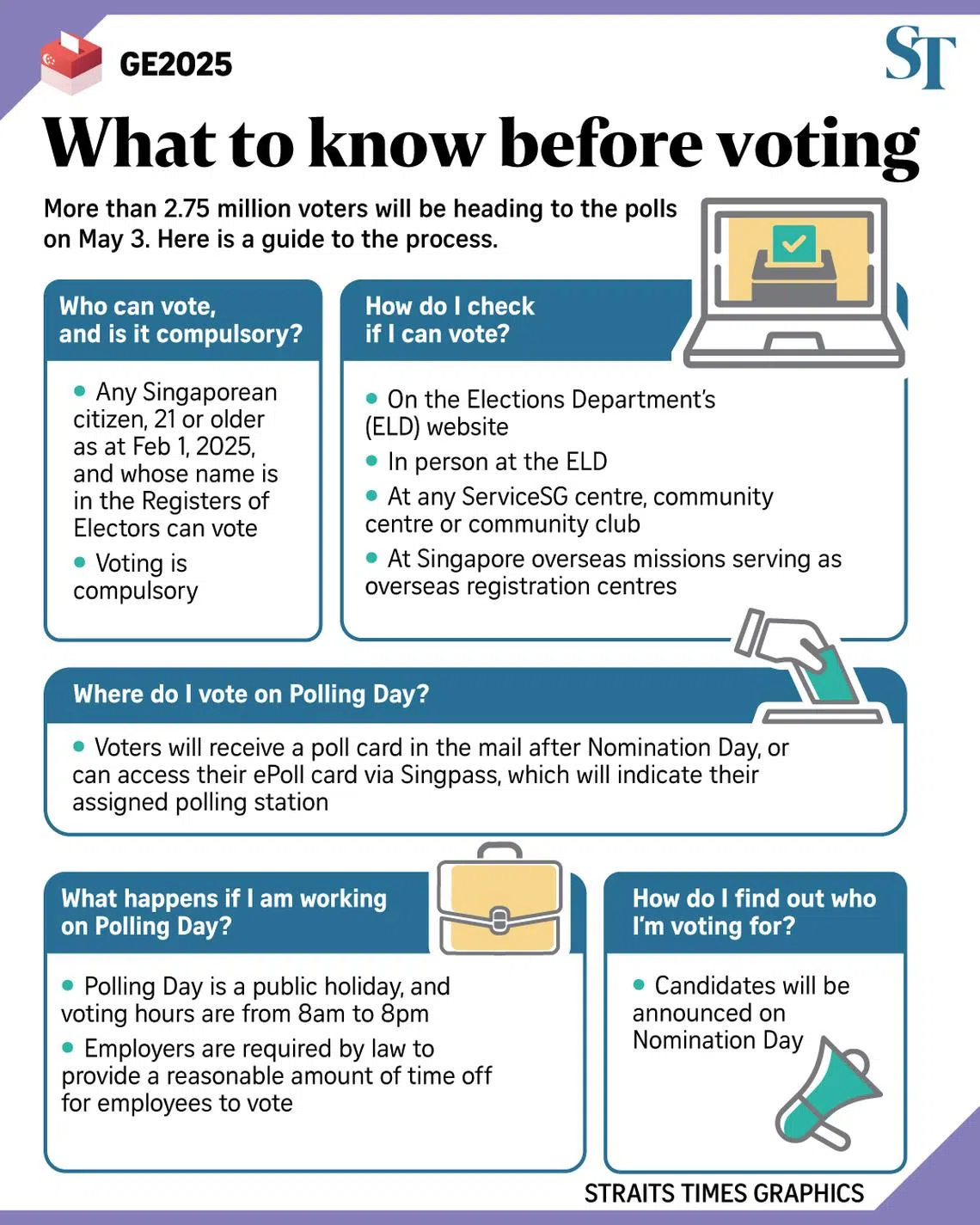GE2025: Do vote in the afternoon, don’t live-stream – advice for Cooling-off and Polling days
Sign up now: Get ST's newsletters delivered to your inbox

Voters may check their polling station’s queue status by scanning the QR code on their poll card before heading to their voting centre.
ST PHOTO: LIM YAOHUI
Follow our live coverage here.
SINGAPORE – The Elections Department (ELD) is encouraging voters to consider casting their votes in the afternoon on Polling Day to avoid long queues in the morning.
Singaporeans go to the polls on May 3.
In an advisory on May 1, ELD said voters may check their polling station’s queue status by scanning the QR code on their poll card before heading to their voting centre.
It also reminded voters to refrain from wearing any attire or carrying any item to the polling station that has images that may be interpreted as influencing other voters or canvassing support for any particular political party, candidate or group of candidates.
“If they do so, they may be turned away by election officials at the polling stations,” added ELD.
Examples of these items include but are not limited to attire, bags, water bottles, fans or badges with prints on them that are identical to or closely resemble a political party or candidate’s allotted symbol, or bear words that may be interpreted as showing support for a political party, candidate or group of candidates.
Carrying objects or soft toys that are identical to, closely resemble or are associated with a political party or candidate’s symbol and are likely to be associated with a candidate by the public may also result in a voter being turned away by election officials.
Voters are reminded to take along their original NRIC or passport and poll card for voting. Otherwise, they can present their digital NRIC and ePoll card on the Singpass app.
ELD said voters are encouraged to use the self-inking “X” stamps provided at the polling booths.
However, they may use their own pen to mark “X” in the demarcated area to indicate their choice of candidate or group of candidates on their ballot paper, ELD added.
In a separate statement, the police urged voters to walk or take public transport to their respective polling stations.
Vehicles found parked indiscriminately or causing obstruction will be issued with a summons and may be towed away.
For those who require special assistance, the police said there will be specific drop-off points at all polling stations for vehicles transporting those who are sick, frail or have disabilities. It added that those driving can approach the election officials for assistance and direction.
“Priority queues and wheelchairs are also available for their use if required,” ELD said.
The police advised voters not to loiter in the vicinity of polling stations after they have cast their votes.
Voters are reminded to stay vigilant and to call the police on 999 immediately should they spot any person wearing unusual attire, acting suspiciously, or leaving items like bags and parcels unattended.
“Where possible, they should also alert the election officials at nearby polling stations,” the police said, adding that they will not hesitate to take firm action against anyone who attempts to disrupt or interfere with the polling process.

SOURCE: ELECTIONS DEPARTMENT
E-rallies, live streaming not allowed during cooling-off period
Candidates and political parties are reminded to refrain from campaigning on May 2, which is Cooling-off Day.
The requirement for campaign silence applies to both physical events and the online space.
Candidates and their supporters are not allowed to canvass, do walkabouts, conduct door-to-door visits or visit the homes and workplaces of voters in connection with the election, said ELD.
Holding rallies, e-rallies and other live streams are also prohibited.
The cooling-off period is traditionally given to voters to afford them time and space to reflect on issues raised during the campaign period, before casting their votes.
During this period, prohibited campaign activities and election advertising include publishing and displaying election advertising that is not already lawfully displayed or published, and sharing, resharing, reposting or boosting online election advertising.
Exceptions to the ban are newspaper, radio and television reports about election matters.
Approved traditional election advertising materials that were already up and not relocated, altered or modified since the start of May 2, as well as lawful online election advertising materials that were already in place before the start of Cooling-off Day are also among the exceptions.
Individuals can continue to share election-related content within a private chat or closed group with family or a small group of friends during this time.
But they are not allowed to wear, use, carry or display campaign propaganda materials. Only candidates are allowed to wear a replica of the symbol allotted to them, added ELD.
ELD reminded candidates and their supporters to be mindful of how they conduct themselves in public and to exercise due care to avoid any action that may be perceived as campaigning.
“Candidates should therefore refrain from making home visits or attending public events where they are likely to attract public attention and may be perceived to be canvassing for support,” said ELD.
It added that candidates may continue to attend religious ceremonies or worship services, meetings or other functions in the course of work or employment as long as they observe the general prohibitions during the cooling-off period.
Publication of election surveys and exit polls at any time during the election period is also prohibited.




